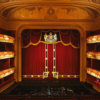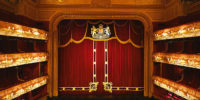 Boys’ Swim Team To Wear Little Santa Hats With Speedos
Boys’ Swim Team To Wear Little Santa Hats With Speedos  AP Art History to Incorporate Memes Into Curriculum
AP Art History to Incorporate Memes Into Curriculum  Ms. Kegel Writes, Stages, and Performs ‘One-Woman Opera’
Ms. Kegel Writes, Stages, and Performs ‘One-Woman Opera’  5 Awesome Virtual Backgrounds for Your Next Zoom Sesh
5 Awesome Virtual Backgrounds for Your Next Zoom Sesh  KEC Reduces Carbon Emissions by Replacing All Shuttles with Eight-Seat Tandem Bikes
KEC Reduces Carbon Emissions by Replacing All Shuttles with Eight-Seat Tandem Bikes 
Following the success of this year’s Winter Vocal Festival-turned-opera, Henry Purcell’s Dido and Aeneas, Choral and Vocal Program Director Alysoun Kegel decided to utilize her talents to write and stage her very own ‘one-woman opera.’ Although she has expressed gratitude at the “amazingly shining, beauteous, and vulnerable artistry” of the Dido and Aeneas cast, after conducting both performances, Kegel felt that she had more to offer the world of opera than could be achieved through student vocalists.
“It was during the second night’s curtain call that the idea really came to me,” Kegel stated in an interview. “Dr. McLain and the students gestured toward me and said something along the lines of, ‘We couldn’t have done it without you!’ which made me think, ‘Wow, they really couldn’t have, could they?’ I started the libretto for the opera that night, and the rest is history.”
Dr. Christi McLain, a former Choate vocal instructor and operatic soprano who staged the Choate Dido production, was given a sneak peek of Kegel’s manuscript before the performance. “As someone who’s been in opera for a long time, I can say with certainty that there’s definitely nothing else out there quite so…inspired and unique,” McLain told interviewers last month. “Even Ligeti’s Le Grand Macabre looks clichéd next to this. [Ms. Kegel] told me that this opera would contain every ounce of creative energy she had in her, and from the subtle anticonsumerist metaphors in the harp melodies to the technological distrust manifest in her proto-Indo-European libretto’s rhyme scheme, I don’t doubt that it does. The entire opera is pure…genius.”
Although the official premiere is scheduled for Friday, May 26, members of the Dido and Aeneas cast were given a special performance of the opera over Long Weekend. Reporters were not allowed inside, but they were able to catch up afterward with Mia Rubinstein ’18, Lily James ’17, and Caitlin Lawrence ’17, the singers playing the witches from Dido and Aeneas. The three exited the Gelb theatre with stunned, trancelike expressions, and all three remained unresponsive to reporters’ interactions for nearly forty minutes.
When asked about her experience, Rubinstein, the first to recognize the reporters’ presences, said, “I just…it was…overwhelming…I don’t know how to—” She paused and took six deep breaths before Lawrence continued for her, “It was beautiful, horrifying, shocking, haunting, euphoric, mystical, introspective, and revealing. It was like looking into a mirror and seeing the entire world, except the mirror is made of flaming stars and continuously shattering throughout all of recorded history.” James, who remained unable to speak throughout the interview, only nodded in agreement with the other two.
Katharine Li ’17, who played Dido in the winter opera, described the performance itself in greater detail. “The production begins with Ms. Kegel singing eight fortissimo E7s, accompanied by organ and marimba, both also played by Ms. Kegel. Then it moves into a microtonal choral movement, which is also just Ms. Kegel singing the bass note and filling in the remaining harmonies and dissonances with her own overtones.” Li continued, “My favorite part happened at the beginning of the third hour, when she burns cellphones with each of the seven deadly sins written on them in Latin while singing a succession of tongue trills and unvoiced consonants.”
Another notable part of the performance, mentioned James Rose ’18 and Becca Rubright ’17, the winter opera’s Aeneas and Belinda respectively, comes midway through the fourth hour, when Kegel sings an isolated invertible counterpoint to Gerald Finzi’s “It was a Lover and his Lass,” a piece from the previous year’s Winter Vocal Festival—an operetta of twentieth-century English-language pieces of Shakespearean libretto compiled into a cohesive plotline by Ms. Kegel—that launched her own vocal career at Choate.
Like Dido and Aeneas, which attracted numerous academics and musicians from Yale and other institutions in the area, Kegel’s one-woman opera is expected to attract international attention. The more than six-hour production—separated only by two half-hour near-silences each punctuated solely by two monotone voices a tritone apart repeating the words “This is not an intermission.” every thirty-sixth second—is slated to make waves in the international art world.
“I do hope this attracts more talented vocalists and musicians to Choate,” Kegel told reporters. “Although being one of the only non-conservatory high schools to offer a student opera production is pretty impressive, something like this is enough to set Choate apart from basically any other school on the planet. If all goes well, I’ll probably be able to produce another of these each month to keep us on the cutting edge.”
At press time, Kegel was seen warming up backstage for her school meeting preview performance, which entailed her improvising harmonies on the harpsichord to her German Shepherd, Dede.
 Boys’ Swim Team To Wear Little Santa Hats With Speedos
Boys’ Swim Team To Wear Little Santa Hats With Speedos  AP Art History to Incorporate Memes Into Curriculum
AP Art History to Incorporate Memes Into Curriculum  Ms. Kegel Writes, Stages, and Performs ‘One-Woman Opera’
Ms. Kegel Writes, Stages, and Performs ‘One-Woman Opera’  5 Awesome Virtual Backgrounds for Your Next Zoom Sesh
5 Awesome Virtual Backgrounds for Your Next Zoom Sesh  KEC Reduces Carbon Emissions by Replacing All Shuttles with Eight-Seat Tandem Bikes
KEC Reduces Carbon Emissions by Replacing All Shuttles with Eight-Seat Tandem Bikes